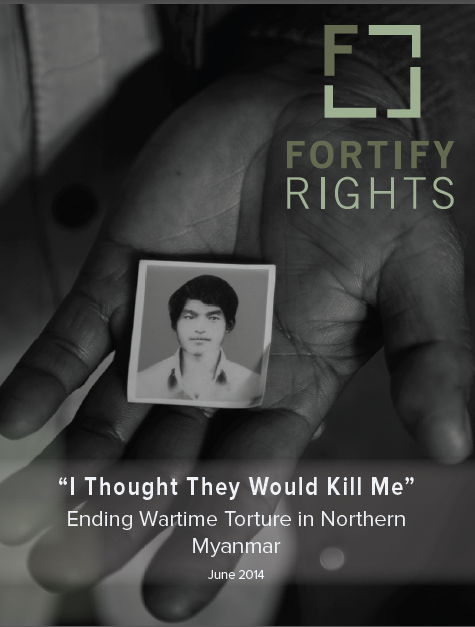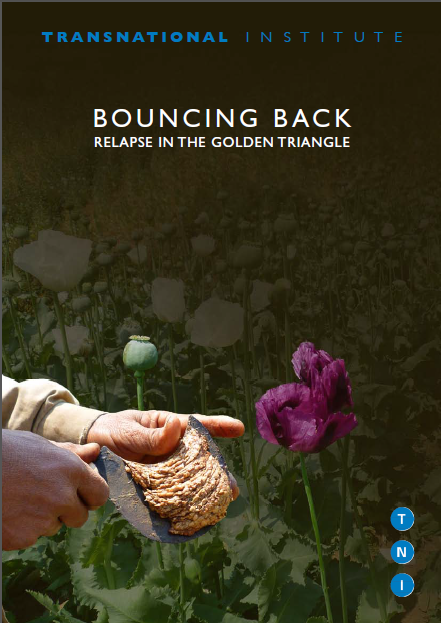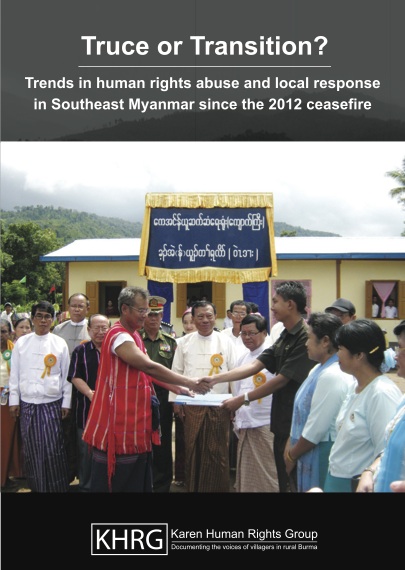Resources (827 found)
Karen Women’s Organization Letter of Appeal on World Refugee Day
I am a woman. I am a refugee. This is my life. Listen to my voice. On World Refugee Day, it is our desire to appeal to the governments, to UNHCR and to all stakeholders, that the rights of refugees be valued and respected […]
• • •Myanmar: End Wartime Torture in Kachin State and Northern Shan State
 (Yangon)— For the past three years, Myanmar authorities have systematically tortured Kachin civilians perceived to be aligned with the Kachin Independence Army (KIA), Fortify Rights said in a new report released today. Fortify Rights believes these abuses constitute war crimes and crimes against humanity. The government of Myanmar should intervene immediately to end the use of torture in the conduct of the ongoing war in Kachin State and northern Shan State, and it should credibly investigate and prosecute members of the Myanmar Army, Myanmar Police Force, and Military Intelligence who are responsible for the serious crimes described in this report.
(Yangon)— For the past three years, Myanmar authorities have systematically tortured Kachin civilians perceived to be aligned with the Kachin Independence Army (KIA), Fortify Rights said in a new report released today. Fortify Rights believes these abuses constitute war crimes and crimes against humanity. The government of Myanmar should intervene immediately to end the use of torture in the conduct of the ongoing war in Kachin State and northern Shan State, and it should credibly investigate and prosecute members of the Myanmar Army, Myanmar Police Force, and Military Intelligence who are responsible for the serious crimes described in this report.
The 71-page report, “I Thought They Would Kill Me”: Ending Wartime Torture in Northern Myanmar, describes the systematic use of torture and other cruel, inhuman, and degrading treatment or punishment (“ill treatment”) of more than 60 civilians by Myanmar authorities from June 2011 to April 2014. Members of the Myanmar Army, Myanmar Police Force, and Military Intelligence deliberately caused severe and lasting mental and physical pain to civilians in combat zones, […]
• • •Opium Cultivation Bounces Back: TNI Report Shows Dramatic Failure of ASEAN’s ‘Drug Free’ Strategy
 Bouncing Back – Relapse in the Golden Triangle, a new in-depth report by the Transnational Institute (TNI) launched in Yangon, Burma/Myanmar, on Monday June 2, highlights the profound changes in the illicit drugs market in the Golden Triangle – Burma, Thailand and Laos – and neighbouring India and China over the past five years. The report outlines the causes and consequences of a doubling of opium cultivation after a decade of decline. It argues that repressive drug control policies have failed to reduce consumption and production and instead led to more dangerous forms of drug use, growing human rights abuses and impoverishment. It finally highlights the workable alternatives that offer a better prospect for addressing drug-related problems in Southeast Asia. […]
Bouncing Back – Relapse in the Golden Triangle, a new in-depth report by the Transnational Institute (TNI) launched in Yangon, Burma/Myanmar, on Monday June 2, highlights the profound changes in the illicit drugs market in the Golden Triangle – Burma, Thailand and Laos – and neighbouring India and China over the past five years. The report outlines the causes and consequences of a doubling of opium cultivation after a decade of decline. It argues that repressive drug control policies have failed to reduce consumption and production and instead led to more dangerous forms of drug use, growing human rights abuses and impoverishment. It finally highlights the workable alternatives that offer a better prospect for addressing drug-related problems in Southeast Asia. […]
Myanmar: “Build on Achievements and Reach for Democracy” – Outgoing UN Special Rapporteur
GENEVA (30 May 2014) – The United Nations Special Rapporteur on the human rights situation in Myanmar, Tomás Ojea Quintana, today calls on the Government and people of Myanmar to build on the many achievements of the last three years in laying a solid foundation for a robust democracy.
• • •Myanmar: Constitutional Reform, A Crucial Step in the Transition to A More Democratic Nation
GENEVA (23 May 2014) – The United Nations Special Rapporteur on the human rights situation in Myanmar, Tomás Ojea Quintana, today called on Myanmar to press forward with the on-going process of constitutional reform[…]
• • •Asia and North America Drive Global Methamphetamine Seizures to Record Levels, UNODC Reports
Tokyo (Japan), 20 May 2014 – Growing demand in East and Southeast Asia is leading to an expansion of global production and trafficking in methamphetamine and new psychoactive substances, according to a UN Office on Drugs and Crime (UNODC) report released here today […]
• • •2014 Global Synthetic Drugs Assessment – Amphetamine-type Stimulants and New Psychoactive Substances
 Growing demand in East and Southeast Asia is leading to an expansion of global production and trafficking in methamphetamine and new psychoactive substances, according to the report 2014 Global Synthetic Drugs Assessment – Amphetamine-type Stimulants and New Psychoactive Substances, a report produced by UN Office on Drugs and Crime (UNODC). The launch of the report was hosted by Japan’s Ministry of Foreign Affairs […]
Growing demand in East and Southeast Asia is leading to an expansion of global production and trafficking in methamphetamine and new psychoactive substances, according to the report 2014 Global Synthetic Drugs Assessment – Amphetamine-type Stimulants and New Psychoactive Substances, a report produced by UN Office on Drugs and Crime (UNODC). The launch of the report was hosted by Japan’s Ministry of Foreign Affairs […]
Tony Blair’s Secret Involvement With Burma’s Government
Burma Campaign UK is calling on Tony Blair to disclose what his involvement is with President Thein Sein of Burma.
Tony Blair has visited Burma on around three occasions, and is believed to be providing some kind of advisory role to the President. However, for the past year he has been refusing to disclose exactly what his role is, and what kind of advice he is providing. The British Foreign Office, which helped to arrange at least one of his visits to Burma, has turned down a freedom of information request asking for the details and purpose of his visit […]
• • •Truce or Transition? Trends in Human Rights Abuse and Local Response in Southeast Myanmar Since the 2012 Ceasefire
In January 2012, the Myanmar government and the Karen National Union (KNU) signed a preliminary ceasefire agreement, bringing to a halt what is often referred to as the world’s longest-running civil war. This conflict engendered severe human rights abuse of civilians at the hands of a range of armed actors, primarily at those of the Myanmar Armed Forces (Tatmadaw). The ceasefire and other recent political developments in Myanmar have altered the ways in which human rights abuse is experienced by Karen people in the Southeast, and transformed the context within which these abuses can be addressed. This report aims to demonstrate how trends in human rights abuse have changed during the post-ceasefire period […]
• • •Council Conclusions on the Establishment of a Human Rights Dialogue with Myanmar/Burma
The Council adopted the following conclusions:
The Council recalls the adoption in 2001 of the European Guidelines on human rights dialogues, revised in 2008.
The Council recognizes the importance of further strengthening the relationship between the European Union and Myanmar/Burma by establishing an EU-Myanmar/Burma Human Rights dialogue, as foreseen in the Council Conclusions on the Comprehensive Framework for the European Union’s policy and support to Myanmar/Burma of 22 July 2013 and agreed during the EU-Myanmar/Burma Task Force held on 13-15 November 2013 […]










 All posts
All posts